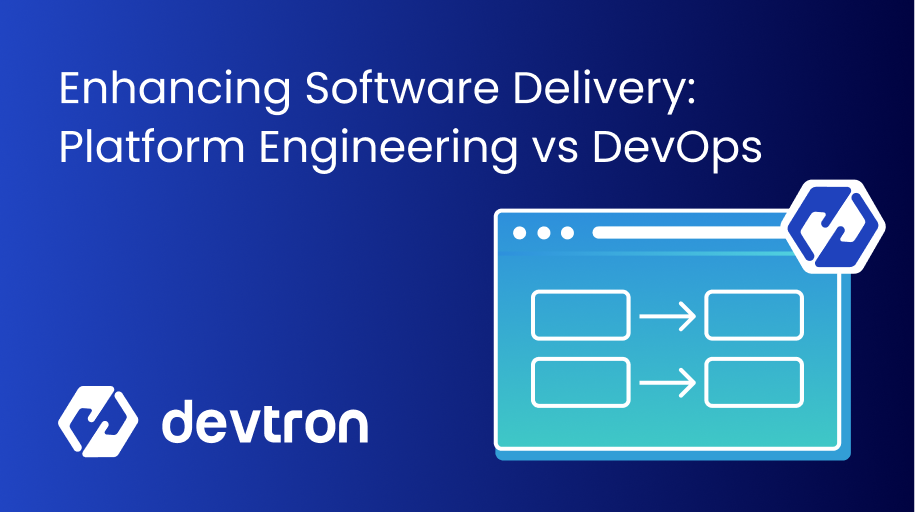The evolution of software development methodologies has led to the emergence of Platform Engineering and DevOps, each addressing the efficiency and innovation demands in software development and operations. Platform Engineering focuses on creating a supportive infrastructure platform, enabling developers to self-serve and streamline their workflow. DevOps, conversely, blends development and operations teams to improve collaboration and automate processes. Though they share goals of enhancing software delivery, their approaches differ. This blog will explore these differences, offering insights into how they complement each other and how organizations can leverage both to solve common software development challenges.
Imagine a development environment where operations are automated, and developers have the tools they need at their fingertips. Learn how integrating Platform Engineering with DevOps practices can make this a reality.
The Genesis and Goals of Each
The technological landscape's constant evolution has given rise to two pivotal approaches in software development and operations: Platform Engineering and DevOps. Each methodology originates from a distinct need to address specific challenges within the software development lifecycle, yet their ultimate goals converge on efficiency, innovation, and streamlining operations.
Platform Engineering: Enhancing Infrastructure for Application Development
Platform Engineering plays a critical role in application development by offering APIs and apps within the internal developer platforms (IDPs). These platforms are enriched with open source and proprietary toolchains, facilitating seamless integration and development workflows. By leveraging providers of cloud services, such as AWS, platform engineering ensures developers have access to scalable and robust environments. This empowerment allows for the mitigation of bottlenecks in the software development process, enabling faster innovation and deployment.
DevOps: Cultivating a Culture of Collaboration and Efficiency
DevOps, on the other hand, represents a cultural and procedural shift that aims to bridge the historical gap between software developers and IT operations teams. Originating from the need to enhance collaboration and streamline the entire software development and delivery process, DevOps culture integrates practices such as Continuous Integration (CI) and Continuous Deployment (CD), along with automation strategies, to foster a more dynamic, responsive, and efficient workflow. DevOps engineers play a crucial role in implementing these practices, ensuring that both development and operations teams can work in harmony towards common objectives. The focus on communication, collaboration, and the automation of software delivery processes underlines the core mission of DevOps: to improve the speed, quality, and reliability of software releases.
Key Components and Tools
Adopting Platform Engineering and DevOps methodologies involves leveraging a variety of components and tools designed to enhance the efficiency and reliability of software development and delivery. These tools not only support the technical aspects of these methodologies but also embody the principles of automation, scalability, and observability that are central to their success.
Infrastructure and Automation
Infrastructure as Code (IaC) has revolutionized the way we manage and provision computing infrastructure. Tools like Terraform and Puppet enable teams to automate the setup and maintenance of infrastructure using code, ensuring consistency, and reducing manual errors. IaC facilitates rapid provisioning, version control, and repeatability of infrastructure deployment, making it a cornerstone for both Platform Engineering and DevOps practices.
Automation extends beyond infrastructure provisioning to include configuration management and deployments. It ensures that software is released efficiently, consistently, and reliably across different environments, reducing the potential for human error and increasing the speed of delivery.
Containers and Orchestration
Docker and Kubernetes play pivotal roles in both paradigms by providing solutions for containerization and orchestration. Docker containers package software, libraries, and dependencies together, ensuring consistency across environments, while Kubernetes orchestrates these containers, managing their deployment, scaling, and operation. This combination supports the scalability and functionality of applications, particularly in a microservices architecture, where services are developed, deployed, and operated independently.
CI/CD and Version Control
Continuous Integration (CI) and Continuous Delivery (CD) are practices that automate the integration and delivery of code changes. Tools like GitLab and Jenkins facilitate these practices by automating the build, test, and deployment processes. This automation helps in identifying and addressing bugs more quickly, improving software quality, and speeding up the time to market. Version control systems, such as Git, play a crucial role in CI/CD by tracking and managing changes to the codebase, enabling more efficient collaboration and rollback capabilities.
Observability and Reliability
Maintaining the reliability of software systems requires deep observability, which is achieved through monitoring metrics, logs, and tracing. These tools provide insights into the health and performance of applications and infrastructure, enabling teams to detect and resolve issues proactively. Site Reliability Engineering (SRE) principles further enhance this by applying a software engineering approach to operational problems, focusing on creating scalable and highly reliable software systems. SRE practices are integral to both Platform Engineering and DevOps, emphasizing the importance of reliability and observability in achieving operational excellence.
Through the strategic use of these components and tools, organizations can foster environments that support rapid development, efficient operations, and high-quality software delivery, aligning with the goals of both Platform Engineering and DevOps methodologies.
Implementation and Culture
Implementing Platform Engineering and DevOps methodologies goes beyond the adoption of tools and technologies; it necessitates a cultural shift within organizations. This shift influences workflows, enhances the developer experience, and integrates security practices into the software development lifecycle (SDLC).
Workflow and Methodology
The SDLC in environments driven by DevOps and Platform Engineering is characterized by a more iterative, collaborative, and automated approach. These frameworks break down the traditional silos between development, operations, and other departments, fostering a culture of collaboration. This not only accelerates the development process but also enhances the quality and reliability of software products. By encouraging open communication and continuous feedback, organizations can adopt a more adaptive and responsive workflow, aligning development efforts more closely with business objectives.
Developer Experience and Productivity
Both DevOps and Platform Engineering significantly enhance the developer experience by streamlining workflows and providing self-service platforms. Developers have more autonomy and can access the tools and resources they need without waiting on other teams, which boosts productivity and accelerates the pace of innovation. This empowerment allows developers to focus on coding and creativity, rather than being bogged down by operational concerns. The result is not only a faster software delivery but also an improvement in the quality of the software, as developers can incorporate feedback and make changes more efficiently.
Security and Compliance
Integrating security practices into the SDLC is a key component of both methodologies, often referred to as "DevSecOps" in the context of DevOps. This approach ensures that security considerations are not an afterthought but are integrated from the onset of project planning and throughout the development process. Automating security practices and compliance checks helps in identifying and mitigating vulnerabilities early, reducing the risk of security breaches. Furthermore, policies and practices around security and compliance are enforced consistently across projects, ensuring that the software meets regulatory standards and is secure by design.
The implementation of Platform Engineering and DevOps not only requires a shift in tools and processes but also a fundamental change in organizational culture. This shift promotes a more collaborative, efficient, and secure approach to software development, significantly enhancing the capacity of organizations to deliver high-quality software at a faster pace.
Comparison and Synergy
While Platform Engineering and DevOps share the overarching goal of enhancing software delivery and operations, they approach this goal from different perspectives. Understanding their differences and how they can collaborate brings significant benefits to organizations.
Differences in Focus and Approach
Platform Engineering adopts a broader, systemic approach, focusing on building and maintaining an internal developer platform (IDP) that abstracts away the complexities of the underlying infrastructure. This approach is centered on enabling developers through self-service capabilities, automation, and an emphasis on developer experience. The goal is to provide a comprehensive platform that developers can use to efficiently manage their applications' lifecycle without needing deep expertise in infrastructure or operations.
DevOps, in contrast, is more process-focused, emphasizing the cultural and procedural changes required to bridge the gap between development and operations teams. It prioritizes continuous integration, continuous deployment (CI/CD), and automation, aiming to streamline the software development lifecycle (SDLC). DevOps seeks to foster a culture of collaboration, where developers and operations professionals work closely together to accelerate software delivery and improve reliability.
Collaboration and Integration
Despite these differences, there is significant room for collaboration and integration between DevOps teams and platform engineering teams. Platform engineering can provide the robust, scalable infrastructure and tooling that DevOps practices require to be effective. For instance, the self-service capabilities and automation provided by a platform can significantly speed up the CI/CD pipelines crucial to DevOps.
Furthermore, the synergy between both methodologies can enhance both software delivery and infrastructure management. DevOps practices can guide the evolution of the platform, ensuring it meets the needs of both developers and operations teams, while platform engineering can ensure the infrastructure is reliable, scalable, and secure. This collaboration can lead to a more resilient and agile environment, where software can be developed, tested, and deployed more efficiently and with higher quality.
Enhancing Software Delivery and Infrastructure Management
The integration of Platform Engineering and DevOps methodologies allows organizations to leverage the strengths of each: the systemic, infrastructure-oriented focus of platform engineering, and the process-driven, collaborative approach of DevOps. Together, they create an environment where software delivery is not just accelerated but also made more reliable and secure. By fostering a culture that values collaboration, automation, and efficiency, organizations can achieve a competitive edge in software development and operations, meeting the demands of modern business and technology landscapes.
Leveraging Open Source in DevOps and Platform Engineering
Both DevOps and Platform Engineering significantly benefit from the adoption of open source tools and frameworks. Open source solutions offer flexibility, transparency, and a wide community support, crucial for troubleshooting and innovating at pace. This approach not only accelerates development but also fosters a culture of collaboration and knowledge sharing.
Application Development: From Concept to Deployment
Application development is a complex process that requires a sophisticated ecosystem of tools and practices. By integrating application development environments with DevOps and Platform Engineering principles, organizations can overcome common challenges such as resource allocation, dependency management, and deployment bottlenecks. Tools and practices derived from these methodologies enhance agility and efficiency, allowing for a more streamlined development process.
Certification and Skill Development in DevOps and Platform Engineering
Certifications play a crucial role in validating the skills and knowledge of professionals in DevOps and Platform Engineering. They serve as a benchmark for expertise in various tools, practices, and philosophies. Encouraging team members to pursue certifications not only boosts individual competency but also enhances the collective capability of teams to implement effective DevOps practices and platform engineering solutions.
Discover More with Devtron
Dive deeper into the world of Platform Engineering and DevOps to transform your software delivery and operations. Explore our comprehensive eBooks at Devtron for insightful strategies and best practices.


